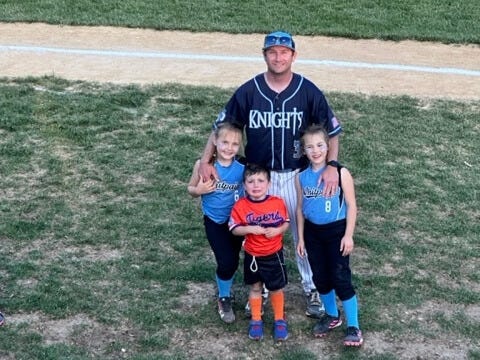
PHILADELPHIA (KYW Newsradio) — Patrick and Lauren Brett, a married couple from Blue Bell, have been going to Phillies games together since 2012, when they started dating. Over the ensuing 11 years, they estimate they’ve been to nearly two-dozen games.
Patrick and Lauren have never seen the Phillies lose in any of those games they’ve attended together, including Game 3 of last season’s NLCS.
“Oh don’t jinx it,” Lauren says, and Patrick looks around for some wood to knock on.
But the truth is, that streak of Phillies games is nothing compared to the story of Patrick’s second chance or the work he hopes to draw attention to for the rest of his life.
That's the key word: Life.
A young man's dream ends before it can start
Patrick has Philadelphia sports in his blood. His parents worked Phillies games at Veterans Stadium dating back to the ’70s. His mom was a member of the legendary Hot Pants Patrol, and his father worked security.
“Philadelphia sports have always been where my heart has been,” says Patrick.
Unfortunately, Patrick’s heart was the cause of a litany of medical issues in his life. He was born with a congenital heart disease called Tetralogy of Fallot, a combination of four heart defects, which required three open-heart surgeries of him before he was 9 years old.
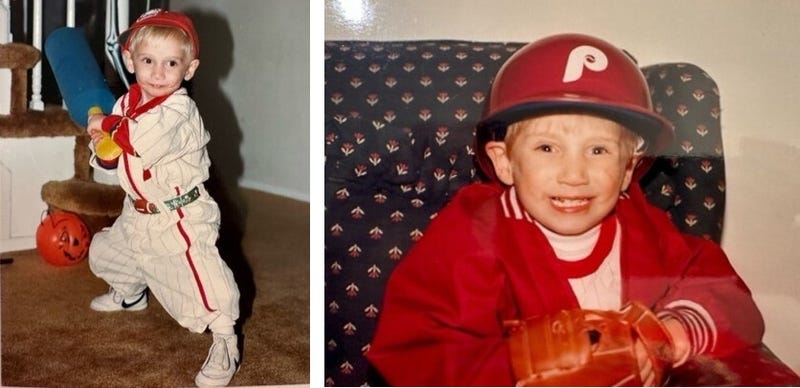
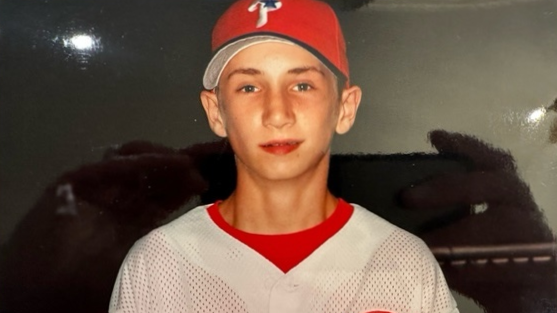
That didn’t stop Patrick from playing sports growing up — soccer, basketball, baseball. He wasn’t allowed to play football out of fear of what eventually happened to Buffalo Bills safety Damar Hamlin in January.
Patrick’s true love was baseball. He wanted to play for the Phillies one day, but right before he turned 14, he passed out while running sprints at basketball practice. He had ventricular tachycardia. On his 14th birthday, he received automatic internal cardiac defibrillator (AICD) and pacemaker implants.
Then came the devastating news.
“I was told I would never be able to play sports again — at 14 years old — which was absolutely crushing,” says Patrick, who vividly remembers crying on the hospital bed with his parents by his side.
But Patrick’s support system was strong — from his parents to his friends to his coach. His coach kept him with the team. Patrick became a coach in eighth grade and was a student manager for his high school team.
That kept him around sports, but he wasn’t out of the woods yet.
Transplant talks begin
Patrick and Lauren met at North Penn High School, where they now work. Patrick, 37, is a future plans counselor, department chair of guidance and an assistant baseball coach. Lauren, 39, teaches math. She comes from a strong baseball family, too, and played high school and collegiate basketball.
Together, they are raising two daughters and a son — Reagan, 8, Laityn, 6, and Nolan, 4 — as Philadelphia sports fans. On Eagles game days, the Bretts make sure there is an assortment of snacks spread out as they watch the game. The kids are athletes just like their parents, who are also associated with the Whitpain Recreation Association.
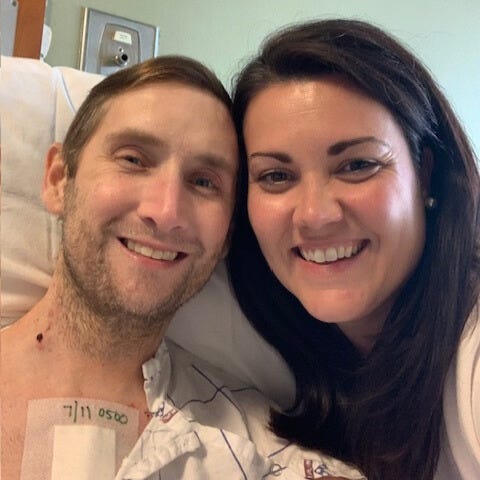
While raising a young family, educating and coaching are paramount in the Bretts’ lives — along with raising awareness for organ donations.
In 2018, medical complications from a non-cardiac surgery led to heart and liver failure for Patrick. A process that was expected 20 years down the line had been accelerated. Late in 2019, Patrick and his doctors started discussions about heart, and potentially liver, transplants.
Then the Bretts went through the transplant acceptance process in November of 2020. Patrick’s health was being managed as an outpatient, which was tough in the midst of the COVID-19 pandemic. On Dec. 23, 2020, they were told he needed to be moved to a hospital.
“He was like, ‘I'm gonna spend Christmas at home with my family, but I'll come afterwards,’” Lauren remembers.
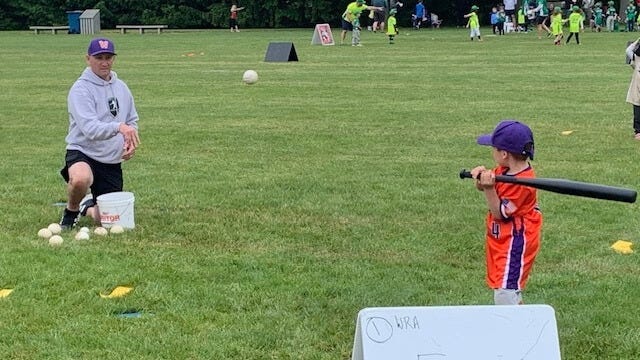
Patrick was admitted to the Hospital of the University of Pennsylvania on Dec. 29. He didn’t leave that hospital until the following summer — about seven months later. For three of those months, he couldn’t be around his family because of strict visitation rules relating to the pandemic.
Patrick wondered: Would ever be able to drive again? Would he be able to shower without any medical equipment? Would he be able to see his children and sit on the sofa with them? Would he be able to go home at all?
Again, Patrick’s support system was strong. Lauren calls it “The Village.” Whether it was family, friends from the North Penn community or the outstanding nursing staff at the hospital, Patrick wasn’t alone even if he was stuck in a hospital.
Then came the call on July 2, 2021: It was transplant time. It was time for a second chance at life.
The next day, Patrick said goodbye to Lauren and his children on FaceTime. Then he was wheeled to the operating room, just like he’d been wheeled off the basketball court as a teenager years before.
'You can't take them with you'
Patrick received a new heart and liver. It has left him with mixed emotions.
On one hand, physically he feels immensely better. He’s playing sports again. He got to lift weights for the first time in his life. He can carry his young kids up the steps. He couldn’t do that before.
On the other hand, Patrick recognizes another person died before this gift of life could take place.
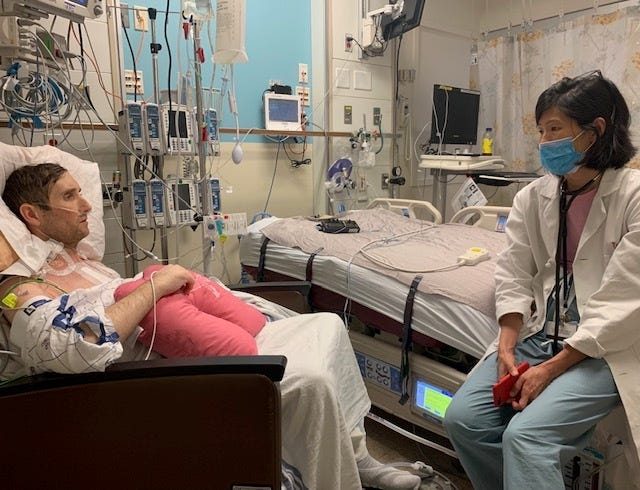
Patrick has spoken over the phone with his donor’s mother, and they have texted. He is leaving it up to her about where she wants to take their interactions. He credits her and her late son for the donation because he was not designated as an organ donor on his driver’s license.
“She’s the one who ultimately made the decision,” said Patrick. “That is the reason I’m alive.”
The same can be said for four other people. This person’s organs saved five total people.
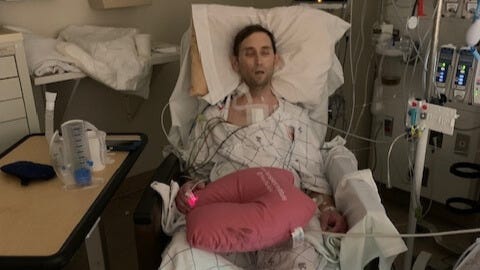
“Bringing awareness to organ donation any way we possibly can is extremely, extremely crucial to saving people's lives and giving people a second chance at life,” Patrick emphasizes. “Whether it's a living donor — to give someone a kidney or a piece of their liver — to unfortunately a catastrophe happening and you donate your organs after you pass, because you can't take them with you. The best way to leave your legacy is to save someone else's life.”
He says while most people are in favor of donating organs, the numbers indicate that significantly fewer people are actually registered. He says it's also important for donors to tell their families their wishes and to make sure they know about that registration — because, in the end, it will be your family who makes that decision no matter what.
The Bretts just participated in the second annual "Dingers for Organ Donation" fundraiser at Wentz Run Park in Blue Bell on Sunday, with proceeds benefitting Gift of Life and Donate Life America.
Never out of it
One of the things Patrick loves about Philadelphia sports is the teams are never out of it. Even if it seems like the score is insurmountable, the game isn’t over.
The same can be said about Patrick.
“If Philly sports teams are never out, them I’m never out of it either. And people who are fighting and waiting for organ donation and waiting for that special person to save their lives, they’re never out of it as well.”
It is fitting, then, that one of the games in the Bretts' Phillies winning streak, a home game on Aug. 26, 2023, was Organ Donor Awareness Night. And they met several people who were tied to an organ donation. They enjoyed hearing other stories.
That night the Phillies dominated the Cardinals 12-1 after St. Louis went on the board first. Despite the lopsided outcome, it was technically another Fightin’ Phils comeback.
So, when will the Bretts head out to the ballpark next?


